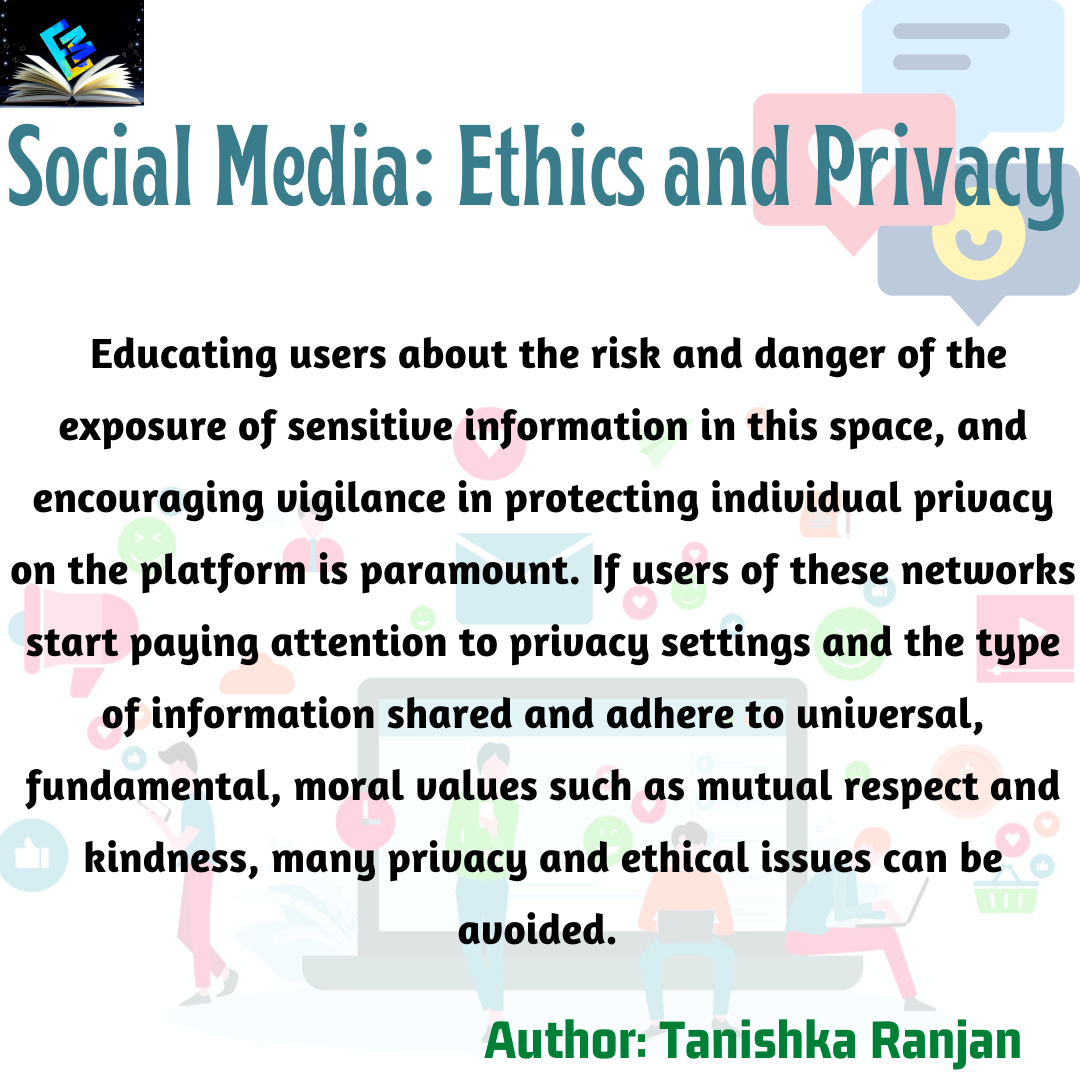
Social Media: Ethics and Privacy
Keywords:- Social Media, Platform, internet, websites, virtual, ethics, data, privacy, VPN
Author: Tanishka Ranjan
Social media is a tool that is becoming quite popular these days because of its user-friendly features. The 21st Century can be described as a “boom” period for social media. The use of social media is ubiquitous and cuts across all age groups, social classes and cultures.
The youth is especially one of the most dominant users of social media. However, the increased use of these sites is accompanied by privacy issues and ethical concerns. Ultimate privacy in the social media domain is very difficult as these media are designed for sharing information.
The weak individual privacy safeguards in the space have resulted in unethical and undesirable behaviour resulting in privacy and security breaches.
INTRODUCTION
Social media is a collective term for websites and applications that focus on communication, community-based input, interaction, content sharing and collaboration.
People use social media to stay in touch and interact with friends, families and various communities. There are many forms of social platforms including blogs, micro-blogs, wikis, social networking sites, photo sharing sites, instant messaging, video sharing sites, podcasts, widgets, virtual world and many more.
Social media has proven to be one of the most effective mediums for the dissemination of information to various audiences. The power of this medium is phenomenal and ranges from its ability to overturn governments, mobilize protest, assist with getting support from humanitarian, organised political campaigns, and organised groups to delay the passing of legislation (as in the case with the Copyright Bill in Canada), etc. Social networking offers a wide range of opportunities that were non-existent before technology.
ETHICS
Ethics is the concept of what is good, bad, right and wrong. In social media, the right ethic is equal to the right perspective. In other words, it can be described as the moral philosophy of an individual or group.
Ethics can also be used to refer to any classification or philosophy of moral values or principles that guide the actions of an individual or group. There is a famous saying “YOU ARE WHAT YOU SHARE”.
With all technology, several challenges can make the use of social media unpleasant.
The three main principles of social media ethics are:
- Authenticity
- Transparency
- Communication
ETHICAL CHALLENGES
- Providing incorrect information
- Making inappropriate comment
- Using social media in irresponsible ways
- Oversharing content
- Messy email and texting
- Non-secure pages on websites
PRIVACY
The tremendous growth of social media has given platforms extraordinary access and influence in the lives of users. Technology has reduced the gap between professional and personal spaces and this often results in information exposure to the wrong audience. The reduction in the separation of professional and personal spaces can affect image management.
Privacy on social networking sites is dependent on the users only because sharing information is the primary way of participating in social communities. Privacy in social networking sites is “multifaceted”.
While there are enormous benefits that can be derived from the effective use of social media there are some unknown unavailable risks that are involved in its use. Much attention should therefore be given to content that is being shared.
Social networks are becoming the platform for hackers and other perpetrators of antisocial behaviour. These platforms offer large volumes of data and information ranging from an individual‘s date of birth, place of residence, work or business, to information about family and other personal activities. In many cases, users unintentionally disclose information that can be both dangerous and inappropriate. Information regarding activities on social media can have far-reaching negative implications for one’s future.
Protecting privacy in today’s networked society can be a significant challenge. The digital revolution has indeed distorted the views of privacy. However, there should be a clear distinction between what should be seen by the general public and what should be limited to a selected group.
MOST COMMON PRIVACY ISSUES
- Data mining
- Privacy setting loopholes
- Location Settings
- Hacking
- Harassment
- Cyberbullying and impersonation
- Addiction and the psychological consequences
- False information
SOME WAYS TO PROTECT PRIVACY IN SOCIAL MEDIA
- Read and understand the privacy terms
- Site features
- Adjusting privacy setting
- Avoid clickbait
- Avoid clicking on social media links
- Changing passwords frequently
- Using VPN
CONCLUSION
One’s digital footprint can make or breach someone. Unethical behaviour and interactions on social media can have far-reaching implications professionally, socially, physically and virtually.
Therefore, educating users about the risk and danger of the exposure of sensitive information in this space, and encouraging vigilance in protecting individual privacy on the platform is paramount. If users of these networks start paying attention to privacy settings and the type of information shared and adhere to universal, fundamental, moral values such as mutual respect and kindness, many privacy and ethical issues can be avoided.
The use of social media should be governed by moral and ethical principles that can be applied and result in harmonious relationships regardless of race, culture, or religious persuasion.
For more information






